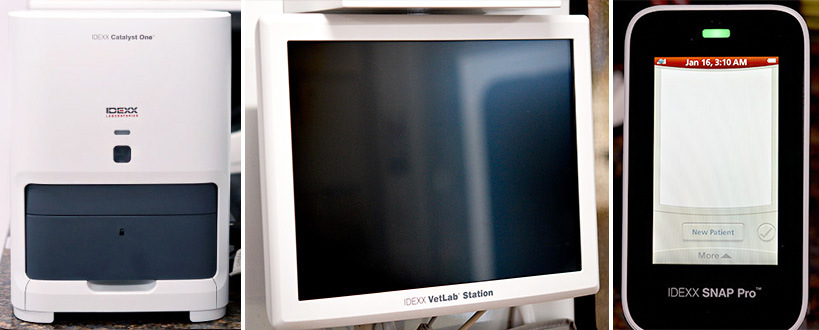Pet Diagnostic Services

Digital Radiology
At Sonoma County Mobile Veterinary Hospital, we use the latest in advanced digital radiology as part of your pet's diagnostic care.
Radiographs are one of the most important diagnostic tools in veterinary medicine. They allow us to view the shape, size and location of organs inside your pet's body. Radiographs are extremely helpful for diagnosing and monitoring many medical and surgical conditions. X-rays are useful for examining your pet's bones, lungs, heart, abdomen, oral cavity and other areas of the body. An x-ray can detect a fractured bone, tumor, heart problem and locate an obstruction or foreign body in your pet's stomach or intestine. X-rays and Ultrasound are often utilized together for an even more accurate diagnosis.
Sonoma County Mobile Veterinary Hospital utilizes a state-of-the-art, digital x-ray machine. Compared to x-rays produced by a traditional machine, the quality of digital radiographs is much better. Because digital x-rays are immediately displayed on a computer monitor, they are produced quickly and can be manipulated to get a better view of your pet's bones and internal organs.
Digital radiology has many benefits for your pet, you and our staff. Our digital x-ray technology produces clear, detailed images that allow our medical team to make a more rapid and accurate diagnosis. Digital x-rays are easier and faster to process than traditional film x-rays, resulting in less time on the x-ray table (and less stress) for your pet. The harsh chemicals once necessary for developing x-rays are not needed for digital x-rays, reducing potential harm to our staff and the environment.
When needed, x-rays will be sent out for second opinions.
Diagnostic Laboratory
Sometimes we need to rely on diagnostic tests in order to make an accurate diagnosis. Thanks to our on-site diagnostic laboratory, your pet's test results are ready within a matter of minutes.
Our laboratory is capable of processing dozens of tests, including complete blood counts (CBCs), blood chemistry panels, parasite testing (to detect the presence of heartworms, intestinal worms and other internal parasites) and more. Your pet's laboratory test results are analyzed and interpreted by our team of specially trained veterinary technicians. The results of the laboratory tests provide fast, accurate treatment for your pet.
Along with heartworm testing, complete blood count, blood-chemistry panel, urinalysis and fecal examination are the most common laboratory tests performed at our hospital. Below are short descriptions of each test.

Complete Blood Count (CBC)
CBC measures the number of red blood cells, white blood cells and platelets in a sample of blood. The numbers of each type of cell provides information to help diagnose anemia, infections and leukemia. If your pet is undergoing treatment for a condition, a complete blood count can help your veterinarian monitor how your pet is responding to the treatment.
Blood-Chemistry Panel (Chem Profile)
A blood-chemistry panel measures electrolytes, enzymes and chemical elements of your pet's blood. Included in a chem profile are important components such as calcium and phosphorous levels, liver enzymes, glucose and total protein. These measurements help your veterinarian determine how your pet's organs, such as kidneys, pancreas and liver, are functioning. Blood-chemistry panels help diagnose and treat illness, as well as monitor your pet's response to treatment. A blood-chemistry panel is usually performed to screen for potential problems and risks before anesthesia is administered.
Fecal Examination (Fecal)
Your veterinarian may examine your pet's feces under a microscope for clues about many different kinds of diseases, including difficulties with digestion, internal bleeding and pancreas disorders. Most importantly, a fecal examination confirms the presence of intestinal parasites, including roundworm, hookworm, whipworm, tapeworm and giardia. A fecal examination is part of your pet's complete wellness examination.
Urinalysis (UA)
Laboratory testing of your pet's urine can help detect the presence of specific substances that normally do not appear in urine, including protein, sugar, white blood cells or blood. Measuring the dilution or concentration of urine can also help your veterinarian diagnose illness. Urinalysis can be helpful in diagnosing urinary tract infections, diabetes, dehydration, kidney problems and other medical conditions.

